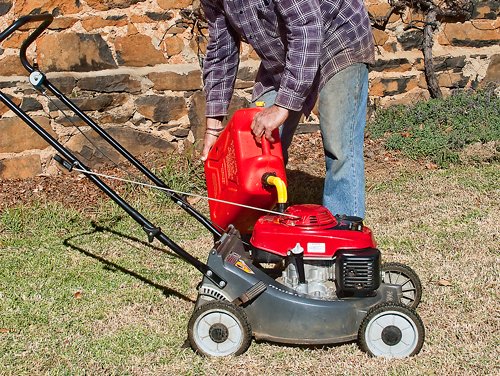If you’re using E10 fuel in your mower, brush-cutter or other petrol-powered garden gear, the winter lay-off is a danger period for your engine.
Winter time generally means your mower, brush-cutter and trimmer have a rest. But just because you’re not using your equipment it doesn’t mean that trouble isn’t brewing. In fact, your mower is more likely to develop problems during winter hibernation than when getting its weekly exercise in summer. This is particularly true if you are using the ethanol-blended fuel known as E10 (ie, fuel that is 90% unleaded petrol and 10% ethanol, the bio-fuel made from plants).
E10 issues
E10 is slightly cheaper than regular unleaded and your mower may well run on it without any immediate problems, but you still need to be on guard. Ethanol has a liking for water and, when E10 fuel is left in the mower’s fuel tank or stored in a fuel tin for extended periods, especially over the wetter and colder winter months, it can readily absorb moisture from the atmosphere. Water getting into fuel has two very bad outcomes.
First, it can corrode parts of your fuel system, which poses a potential safety risk as well as problems with starting and running smoothly.
Worse still, the ethanol can dissolve in the water and this ethanol-water mix will then separate from the petrol, forming two distinct layers (just like oil and vinegar do when a salad dressing is allowed to sit for a while), and that’s when disaster is just waiting to happen when you start up your engine for the first time next spring. Water getting into engines is always bad news, and often very expensive bad news to repair.
Our advice is this: drain the E10 fuel from your mower’s tank now, and don’t store any E10 fuel in tins, either. Add whatever E10 you have left over to your car’s petrol tank (if it’s E10 compatible, which most modern cars are) and buy some new, fresh fuel next spring, when you want to start mowing, etc once more.
E10 compatible?
Don’t be deceived into thinking if your mower is listed as ‘E10 compatible’ that it’s safe from these winter fuel storage problems. Leading manufacturer Honda doesn’t recommend using E10 even though it says its mower engines are E10-compatible. It’s what happens to E10 fuel when stored for a long time, especially over winter or during the wet season in the tropics, which is the problem.
Never compatible
If your power equipment isn’t certified to run on E10 then never use it. The problems can be severe, as the ethanol (with or without water accumulating during winter) can attack fuel system components including plastics, rubber, fibreglass (in particular) and even some metal items.
E10 fuel can also cause problems with two-stroke engines that run on a petrol-oil ‘pre-mix’, as the ethanol doesn’t allow the oil to mix properly with the fuel. This can lead to greater engine wear and tear.
Better bets
The simple way to avoid these problems with E10 and your garden power gear is to use regular unleaded fuel, even if it is slightly more expensive than E10.
If your local service station doesn’t have regular unleaded then using premium unleaded will avoid these winter storage problems. Of the two popular premium blends, 95 octane and 98 octane, 95 is the better bet and is cheaper than 98.
Tip: at the service station, look at the bowser labels carefully, as some premium blends do contain ethanol, and these should be avoided just like E10. If ethanol is present in any fuel sold, it is required by law to say so on the fuel bowser.
Some manufacturers of small-engine garden equipment recommend against using premium unleaded as it can increase combustion chamber deposits in some engines. This however is a minor problem compared to the damage that E10 can cause, especially during longer periods of storage. At worst, the extra combustion chamber deposits may mean more frequent ‘decoking’ of the engine, a relatively simple job for most engines. Unfortunately, most manufacturers of small-engine garden equipment aren’t really helpful on the issue of what is the best fuel to use if regular unleaded is not available.
The bottom line
• Whether your mower or other garden equipment is E10 certified or not, using regular unleaded petrol (ULP) will avoid the winter storage problems associated with E10 fuel. If regular unleaded isn’t available, using premium unleaded (PULP) is the next best bet. Be aware however that some premium-grade fuels contain ethanol (this will be noted on the bowser) and can cause the same problems as E10.
• If you stick with using E10, don’t store it over winter. Drain it and pour it into the tank of your E10-compatible car; or dispose of it in a safe and responsible manner. Then start with fresh fuel for the next mowing season in spring.
About the writer
Fraser Stronach is a motoring journalist but in a former life worked as a motorcycle mechanic and successfully raced motorcycles he tuned himself. His small-engine skills are now used keeping six acres looking good with his ride-on mower, push mower, brushcutter and chainsaw.



